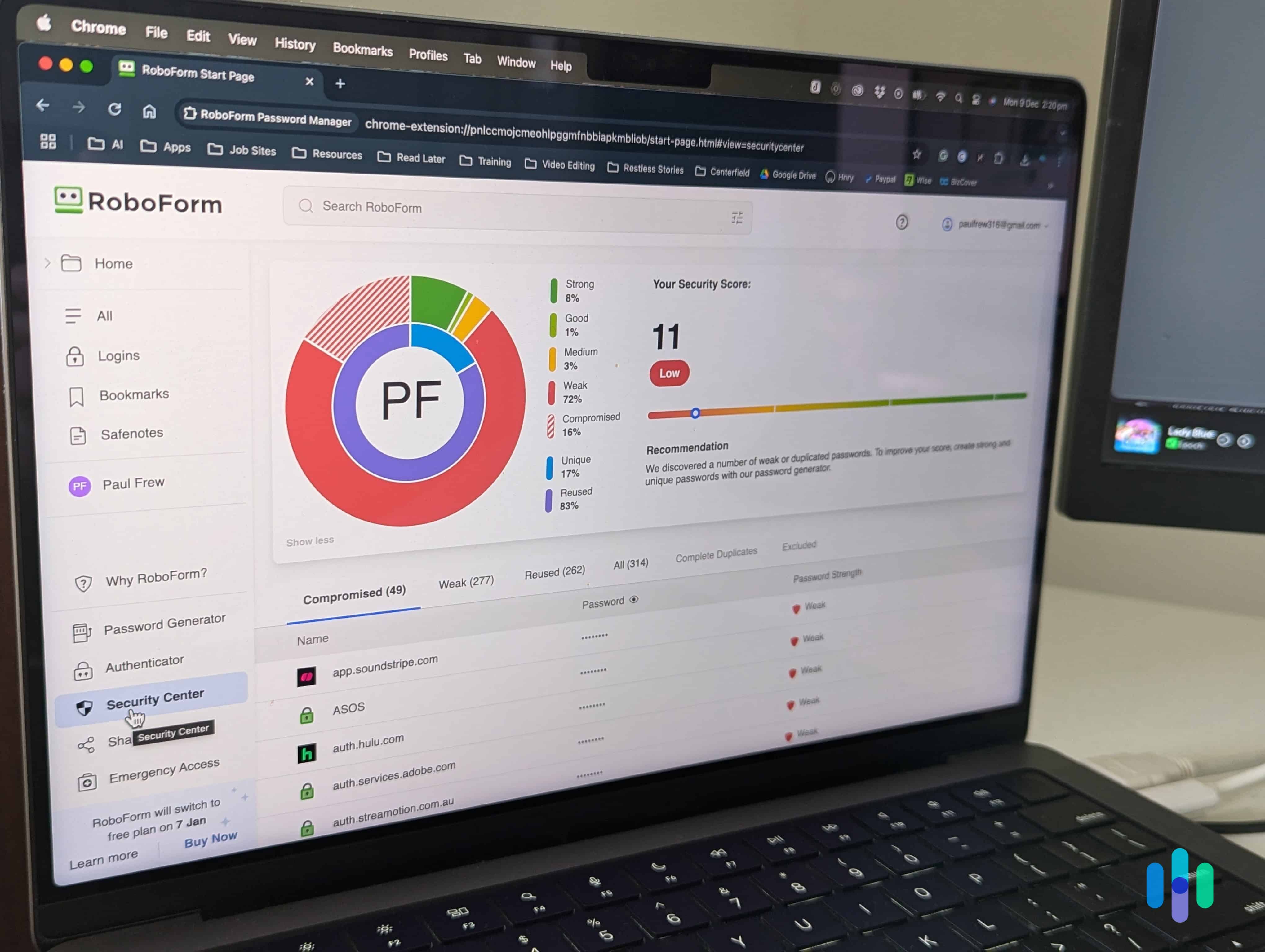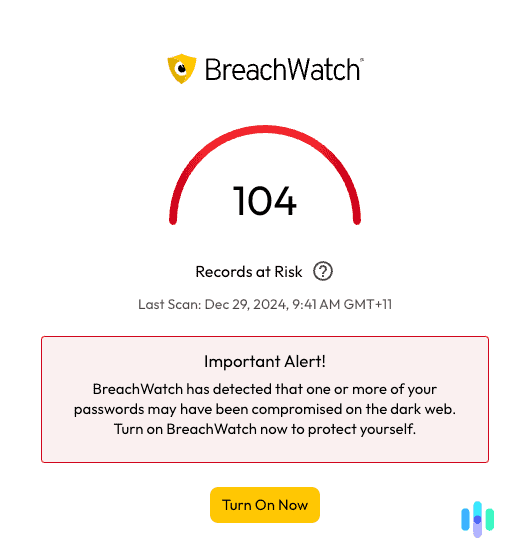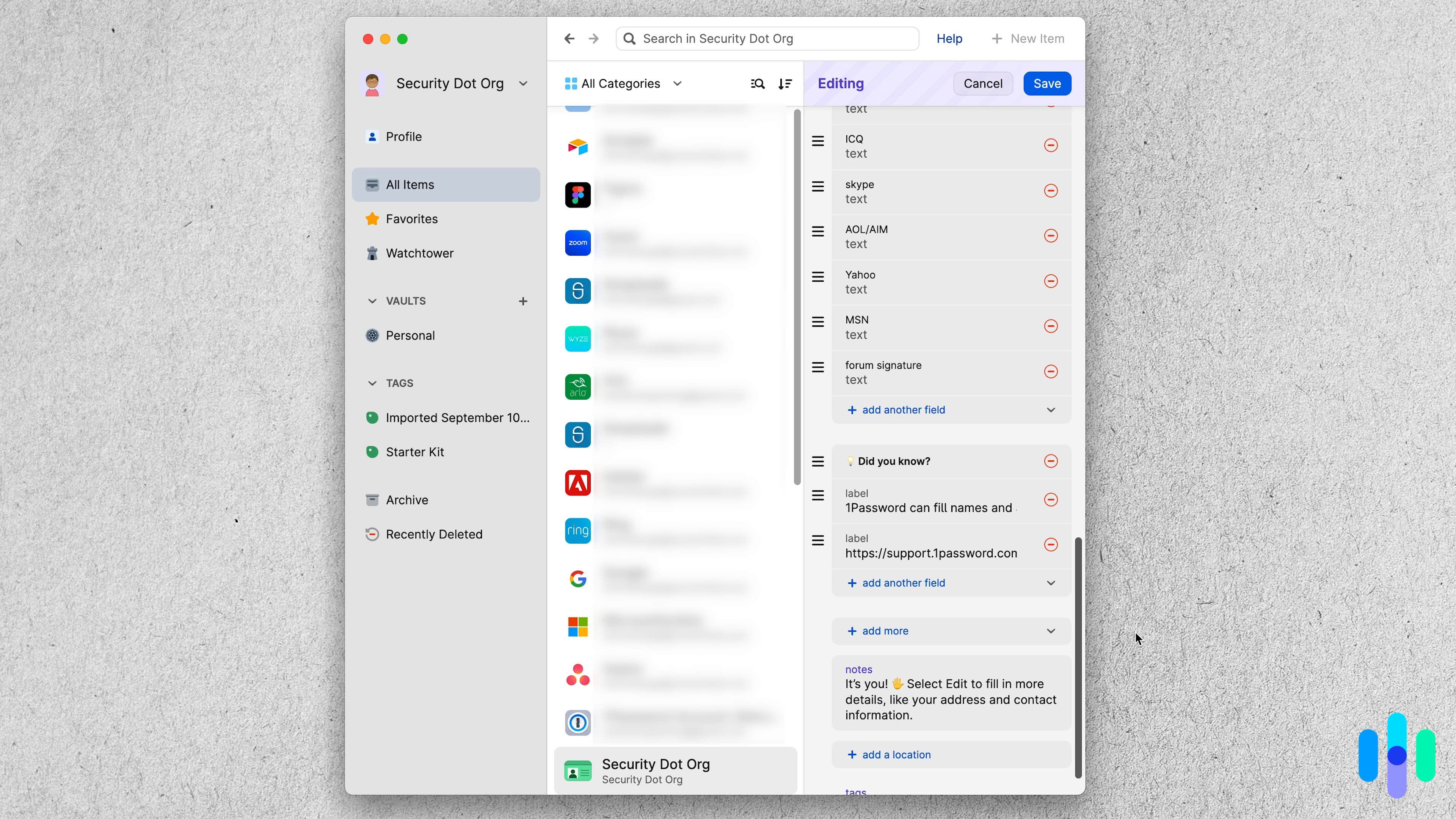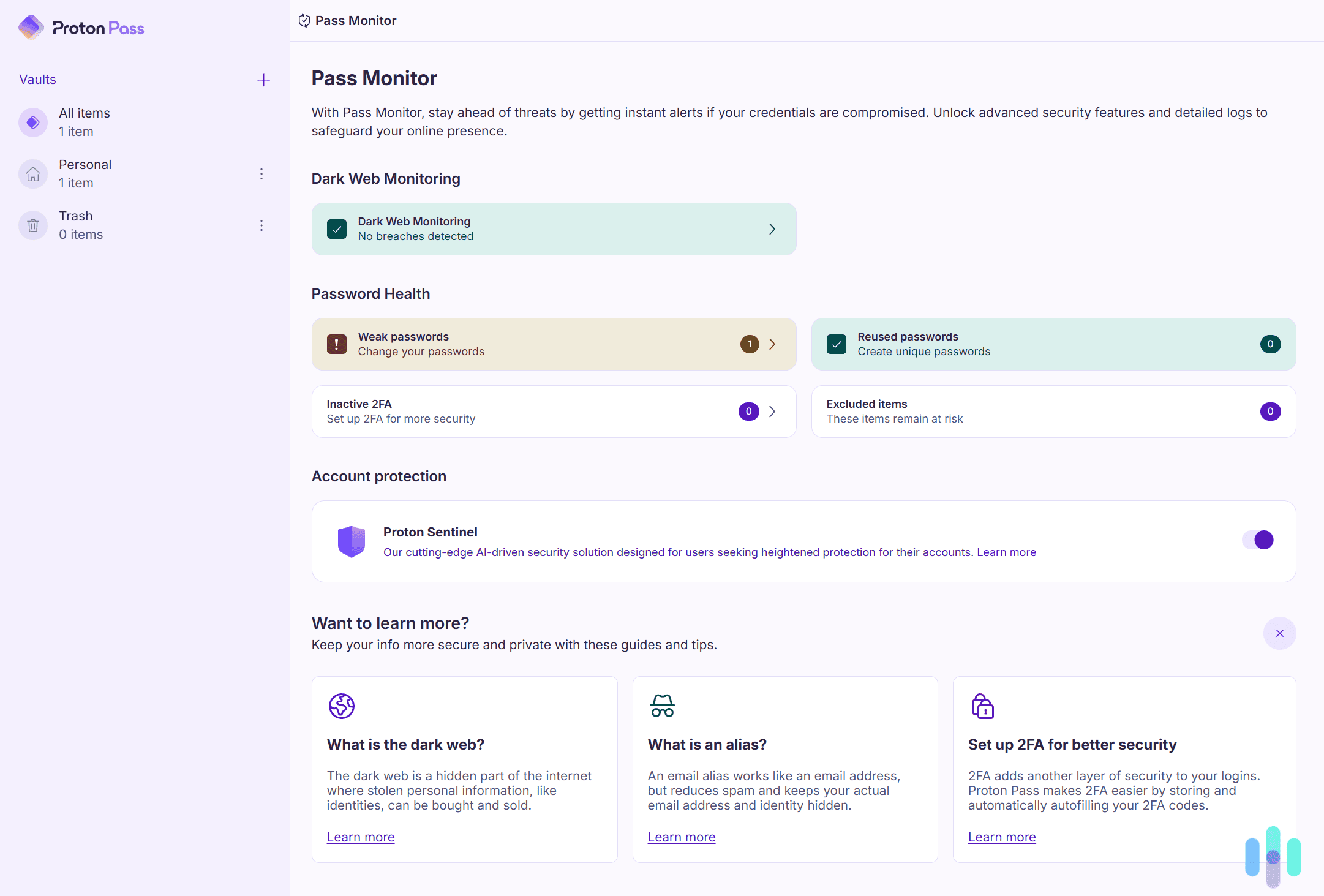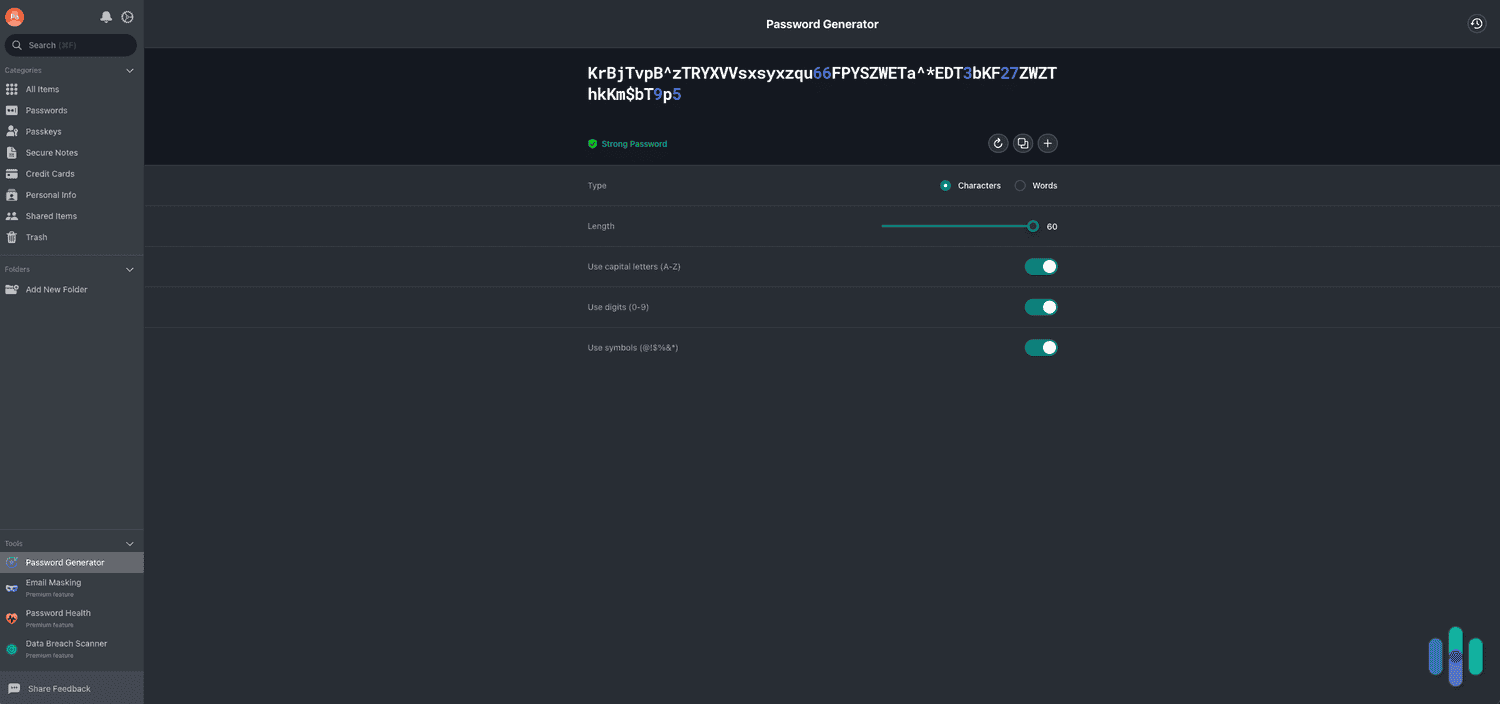The Best Password Managers for Businesses in 2026: Tested by Experts
Our experts found that RoboForm, NordPass, and Keeper offer the three best password security solutions for businesses and organizations.
- Advanced form-filling capabilities to streamline work
- Flexible deployment options include cloud, on-premise, and hybrid configurations
- Emergency access protocols ensure business continuity during unexpected events
- Supports native integration with Google Workspace SSO
- Activity log API makes it easy to extract activity logs to third-party tools
- Granular security rules for user-based or role-based permissions
- Compliant with data security and privacy standards for regulated industries such as healthcare
- BreachWatch actively scans for compromised credentials across your organization
- Zero-knowledge architecture for complete data privacy
Data from IBM’s latest Annual Cost of a Data Breach report shows that, on average, a data breach costs businesses $4.4 million.1 That’s costly even for large organizations, but for small to medium businesses? It can be crushing. And here’s another thing: According to the 2025 Data Breach Investigations Report from Verizon, 81 percent of hacking-related company breaches involve stolen and weak passwords.2
It’s clear that if you want to avoid falling victim to a data breach, your business needs more than just the top password managers. You need the best password managers that can scale with your organization. After testing over three dozen password managers for businesses, we’ve identified three standout options that balance security, usability and value. They are RoboForm, NordPass, Keeper, 1Password, and Proton Pass.
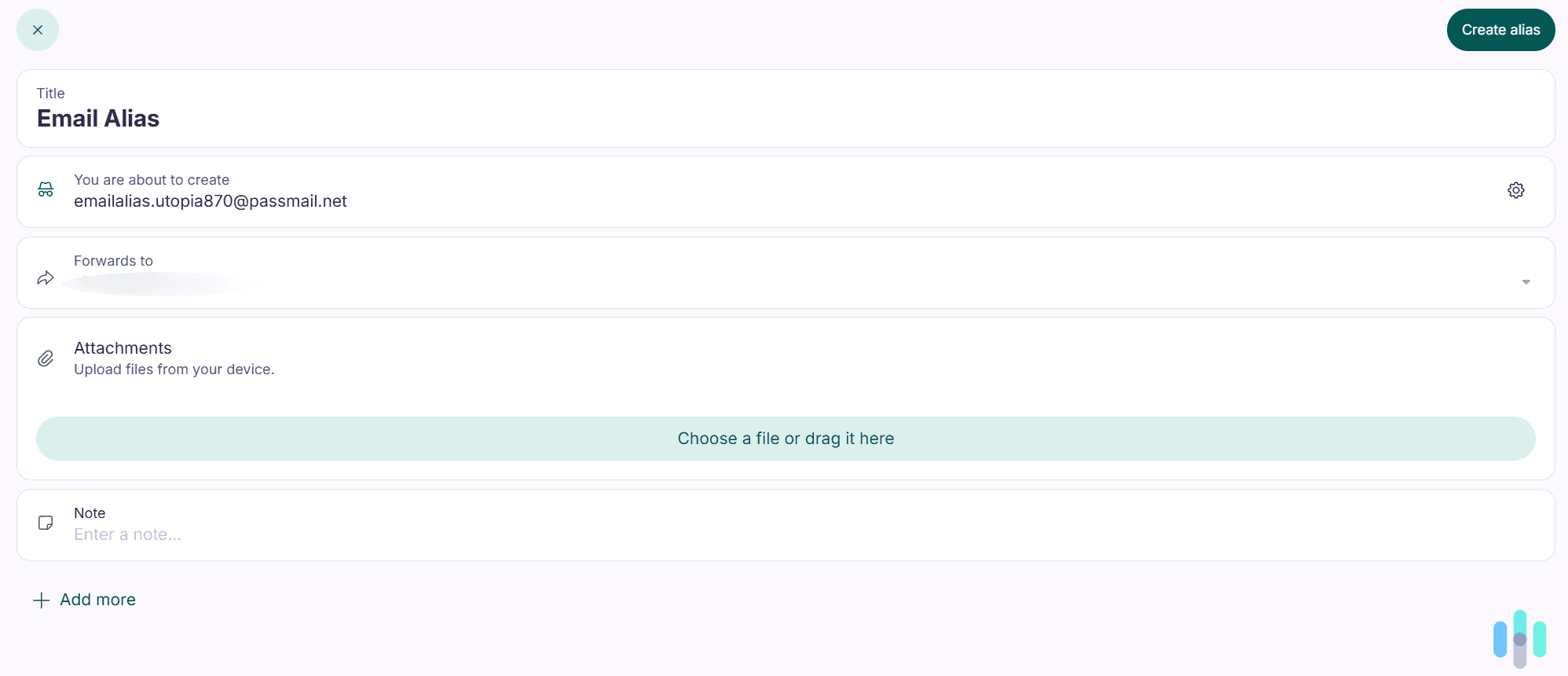
Our Top Recommended Password Managers for Businesses
- RoboForm for Business - Best for Small Teams
- NordPass - Best Google Workspace Integration
- Keeper for Business - Best for Businesses in Regulated Industries
- 1Password - Best for Developer Credentials
- ProtonPass for Business - Best for Privacy and Advanced Threat Detection
Our Methodology: How We Tested Password Managers for Businesses
Our team evaluated a total of 36 password managers that offer solutions to businesses. Over a six-month period, we personally used and tested each password manager, focusing specifically on features we deemed critical to business operations.
We then rated each platform on five key criteria, and then computed their weighted average to come up with a final score for each. These were the key factors we considered and how much they influenced our ratings.
- Security Architecture (40%): Given how critical passwords are to data security, we assessed each platform’s approach to ensuring stored passwords are secure. For instance, we checked if they have a zero-knowledge architecture and which encryption standards they use.
- Team Management Capabilities (25%): All the business-grade password managers we tested have a central admin dashboard, which we then rated based on how much control administrators have over the security and use of the products.
- Ease of Deployment (15%): Setting up a personal password manager is often easy, but we found that ease of deployment typically scales exponentially with the number of endpoint users. We rated each platform based on how easy it was to set up user accounts and integrate each into the team account.
- Compliance (10%): Especially for businesses in regulated industries such as healthcare, compliance with existing data security standards is crucial. We looked at each password manager’s compliance certifications.
- Value for Money (10%): Lastly, we compared how much each platform cost on a per-user basis, and then assessed if they offer good value for money based on their overall features and performance.
Our testing involved using each password manager in a real-world office setting. We examined encryption standards, conducted penetration testing simulations, and evaluated administrative controls. Each product underwent a minimum testing period of 30 days with actual business workflows.
Heading our testing teams were:
- Brett Cruz, our resident cybersecurity expert.
- Cort Honey, a digital safety expert with over 1,000 hours spent on product research and testing.
- Matthew Adkins, one of our writers/editors who has tested and ranked over 100 security products and software.
You’ll learn more about the experts who made these recommendations on our About Us page.
The Best Business Password Managers of 2026
-
1. RoboForm for Business - Best for Small Teams
Start Free Trial Links to RoboformIts affordable pricing is one reason we picked Roboform. RoboForm’s prices for its business-grade password manager starts at $2.23 monthly per user, significantly lower than the professional plans from Proton Pass and 1Password. Even at that price, Roboform offers advanced features we don’t typically see in entry-level plans, including SSO and SCIM provisioning. Those features are reserved only to Proton Pass’ mid-tier and top-tier plans.
As for capabilities, Roboform stood out with its form-filling ability. Its algorithms allow it to accurately complete complex, multi-page forms. We think that’s great for increasing efficiency, especially if your business regularly submits proposals, applications, or regulatory documents. During testing, Roboform completed 94 percent of web forms on the first attempt. The next highest completion rate was with Dashlane at 76 percent.
>> Learn More: Our 2026 Dashlane Review
Fact: RoboForm started out as a form-filling utility in 1998, which is why that’s one of its greatest strengths. It only became a password manager at the turn of the millennium, and their business-grade solutions first launched in 2009.
What We Like
- Accurate form-filling capabilities saves businesses time
- Flexible deployment with cloud, local, and hybrid options
- Extensive compatibility with browsers, even legacy versions
- Emergency access ensures business continuity
What We Don’t Like
- Interface looks dated and lacks visual appeal
- Limited team collaboration features
- Mobile apps lag behind desktop functionality
RoboForm’s Strengths
The Security Center assesses your data and gives you an overall score based on how secure your passwords are. Reliability is critical, especially if you’re a small team that can’t afford password management disruptions during critical operations. We picked RoboForm because during testing, the apps experienced zero downtimes and maintained consistent sync speeds across all devices. That comes at a cost, because frankly, RoboForm’s interface lacks visual appeal. Because of that, though, the overall performance of the software was consistently smooth.
We also like that RoboForm continues to be compatible even with legacy versions of browsers. We recommend always using updated versions for security, but if your business uses legacy browser versions to maintain compatibility with mission-critical web applications, RoboForm should certainly be at the top of your list.
>> Learn More: The Best Password Managers for Chrome
RoboForm’s Weaknesses
We mentioned RoboForm’s dated user interface. While we didn’t find any problems with its functionality, it lacks the intuitiveness of modernly-designed apps such as that of Proton Pass. This could reduce efficiency, especially as your team members get used to the password manager.
We also found RoboForm’s collaboration features basic compared to alternatives like Keeper. It lacks advanced vault sharing, for example, as well as granular permissions and detailed audit logs in the central admin panel. Keep that in mind if you’re planning to grow your operations in the near future. We don’t think those limitations will severely impact small teams, but they can make it harder for large businesses to implement password security strategies.
FYI: While RoboForm offers self-hosted password management (i.e. on-premise vs. cloud), it’s reserved for its Enterprise customers with a minimum of 1,000 unique users.
-
2. NordPass - Best Google Workspace Integration
View Plans Links to NordPassProduct Specs
App Store rating 4.7 stars Supported platforms iOS, macOS, Windows, Android, Linux Encryption standard XChaCha20 Cross-device login Yes Data breach scans Yes Passwordless login Yes Lifetime free plan Yes, for one user Pricing Premium plans start at $1.49 per month If you already use Google Workspace in your business, NordPass can seamlessly slip into your current workflows. All plans include a simple setup for adding SSO for your company’s Google Workspace. That feature rolls out to all of your employees as well. This reduces friction for you and your team while enhancing overall security.
>> Learn About: How to Clear Your Gmail Search History in 2026 (Full Step-By-Step Guide)
What We Like
- Business plans start at $1.79 per month per user
- Granular access based on the user or role
- Uses advanced ChaCha20 encryption to protect passwords
- Activity log tracks credentials across your organization
What We Don’t Like
- Basic plan does not include the security dashboard
- Onboarding and training requires the Enterprise plan
- Best prices require a two-year commitment
- Free trial only lasts for 14 days
NordPass’s Strengths
NordPass’s Password Health feature clearly shows which passwords are easy to compromise. On top of the Google Workspace integration that’s available with all plans, it also integrates with a wide variety of other third-party tools, although that requires the Business or Enterprise plan. Still, we find NordPass’ broad integration capabilities one of its major strengths. 1Password’s business plans also offer plenty of integrations. Check out our NordPass vs 1Password comparison for a complete look at how these two password managers stack up.
Along with its support for third-party integrations, we found NordPass overall easy to use for our business. Its activity log clearly showed how employees create and share credentials, allowing us to easily track all of our organization’s accounts. This allowed us to find out that two employees signed up for the same service, even though we only needed one subscription.
NordPass’s Weaknesses
While NordPass is easy to use, we still like it when services offer an onboarding and training program. It helps us make use of all of the features and capabilities to ensure we get our money’s worth. However, NordPass only offers this to their Enterprise customers. Similarly, we wish they would include the security dashboard on all of their plans, but that’s locked behind their Business and Enterprise subscriptions.
FYI: The Teams package from NordPass can only be purchased as a package for 10 users. That $1.79 per user per month pricing assumes you have 10 users. If you only have six, you’ll actually be paying $3.58 per month.
-
3. Keeper for Business - Best for Businesses in Regulated Industries
 Start Free Trial Links to Keeper
Start Free Trial Links to Keeper
Keeper stands out as the gold standard for businesses operating in regulated industries, such as healthcare and finance. That’s especially true if there are data privacy and security rules in place for your industry. Keeper’s certifications include SOC 2, ISO 27001 and FedRAMP authorization (for federal agencies and government contractors).
Of course, Keeper wouldn’t have gotten those certifications without strict compliance to security and privacy standards. It’s worth pointing out that like NordPass and RoboForm, they have adopted a zero-knowledge architecture. Keeper generates a unique encryption key for each user’s vault. Even the company doesn’t have access to this key. That’s critical if your business needs to maintain attorney-client privilege or patient confidentiality.
Deeper Look: Keeper uses 256-bit AES encryption, also known as military-grade encryption. If you’re into cryptography, the system also uses PBKDF2 for key derivation. It creates a strong, unique key for passwords instead of storing them in plaintext.
What We Like
- BreachWatch continuously monitors the dark web for compromised credentials
- Granular role-based access controls support complex organizational structures
- Secure file storage (up to 100GB) for sensitive documents
- Self-destruct messages for temporary credential sharing
What We Don’t Like
- Five minimum members required and all plans are billed yearly
- Interface can feel overwhelming for non-technical users
- Customer support response times average 24 to 48 hours
Keeper’s Strengths
Keeper offers many extra security tools, including data breach scanning. Keeper’s granular tracking via the admin panel was slightly better than that of Proton Pass. During testing, it let us track every password access, modification, and sharing event. Those logs were even timestamped. If your business has to undergo audits, that level of tracking could prove invaluable. We also like that there’s an option to automatically enforce password policies across the entire organization.
Keeper also monitored the dark web for us via the BreachWatch feature. It worked similarly to Proton Pass’ Pass Monitor, or the data breach scanner with NordPass. As for accuracy, Keeper’s BreachWatch identified three compromised employee passwords within the first week, allowing us to take immediate action.
Keeper’s Weaknesses
While Keeper’s features impressed us, we found the learning curve more challenging compared to RoboForm. The central dashboard offers hundreds of configuration options. That’s great if you want granular control, but if your business doesn’t have a dedicated IT team, you might find the initial deployment more painstaking. Even with our cybersecurity experts, it took us between two to three hours to deploy Keeper in our office. With Proton Pass, it only took us around 45 minutes.
Small teams might also find Keeper’s pricing prohibitive. All plans require a minimum of five users, with prices starting at $2 per user per month. That doesn’t sound bad, but also keep in mind that all plans are billed annually. On top of that, some advanced features like compliance reporting and custom roles require the more expensive Business plan.
Alternative: If you want to deploy password policies across your entire organization but don’t have a dedicated IT team, our #2 pick NordPass might be a better choice. It let us do exactly that with just three clicks. Check out NordPass’ pricing here.
-
4. 1Password
Try It Free Links to 1PasswordProduct Specs
App store rating 4.6 stars Supported platforms iOS, macOS, Windows, Android, Linux Encryption standard AES-256 Cross-device login Yes Data breach scans Yes Passwordless login Yes Lifetime free plan No, only a 14-day free trial Pricing Premium plans start at $2.99 per month 1Password’s business plans offer some of the best features for developers. They can help manage user authentication throughout the entire development pipeline. We particularly like how it works for signing commits for your Git. It provides a more seamless experience for developers while allowing managers to more accurately track the effectiveness of individual employees.
What We Like
- Useful developer tools are included in all business plans
- Prices start at $1.99 per user per month
- Unique managed service provider plan is great for consultants
- Wide range of third-party integrations with Business plan
What We Don’t Like
- Full business plan is expensive at $9.99 per user per month
- Only supports role-based access control
- Purchasing the Business plan requires a sales call
- Limited support available with the Teams Starter Pack
1Password’s Strengths
1Password’s dashboard provides administrators with a clear overview of every credential in your organization. Like we mentioned, we were impressed with 1Password’s developer tools. It’s a standout capability that few other password managers offer. Impressively, they offer all of those tools in the cheapest Teams Starter Plan that supports 10 users for $19.95 per month with an annual plan. We cover all of their subscription options in our 1Password price guide.
Similar to NordPass, 1Password also offers plenty of third-party integrations including Google Workspace, Okta, and OneLogin. However, those integrations require 1Password’s more expensive Business plan to access. We still appreciate that they offer more integrations than ProtonPass, which you can learn more about in our 1Password vs ProtonPass comparison.
Pro Tip: 1Password’s Business plan includes a subscription to their Family plan for every user. That can be a great perk for your employees, allowing them to incorporate the same system they use at work for protection their own personal passwords.
1Password’s Weaknesses
Beyond 1Password’s entry level Teams Starter Plan, which only supports 10 employees, their prices get significantly more expensive. The Business plan starts at $7.99 per month per user if you pay for a year upfront. That adds up to a total price of at least $479.40 for the year if you only have five users. We also don’t like that signing up for the Business plan requires a sales call to subscribe. It’s not the end of the world, but we prefer the option of being able to subscribe online.
>> Budget Protection: The Best Free Password Managers of 2026
-
5. ProtonPass for Business - Best for Privacy and Advanced Threat Detection
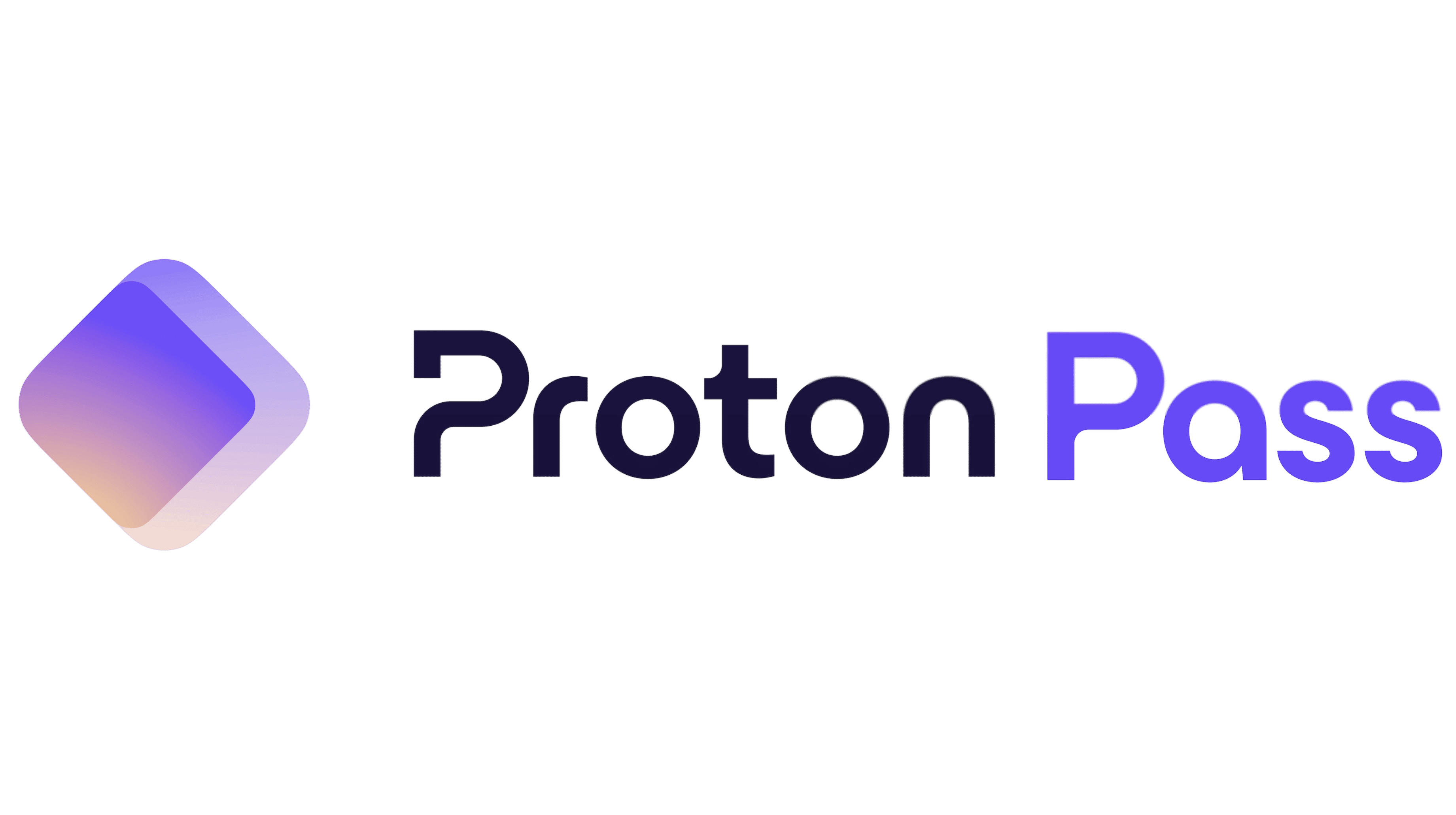 View Packages Links to Proton
View Packages Links to Proton
Proton Pass is a product of Proton, the privacy-first company that made the Proton VPN we tested and ProtonMail. We had high expectations for its password manager, and it didn’t disappoint. It delivered us strong encryption and advanced protections against identity-based attacks.
Pass Monitor and Proton Sentinel are our favorite features. The former scans the dark web for leaked credentials (both business and personal), while the latter combines AI and real human reviewers to block suspicious access attempts.
We also liked the fact that Proton is based in Switzerland and benefits from its strong privacy laws. The company itself has adopted an open-source architecture and has undergone third-party audits for transparency and to build trust with users, especially businesses.
What We Like
- Open-source, zero-knowledge architecture audited by third parties
- Pass Monitor alerts teams if company or personal emails appear in dark web breaches
- Proton Sentinel actively blocks suspicious logins, even with correct credentials
- Centralized admin console with detailed audit logs, SSO, SCIM, and role-based policies
What We Don’t Like
- Relatively new to the business password manager space
- Limited integration with third-party systems and protocols such as SCIM in the Essentials plan
- Pricing is not very approachable for small teams
Proton Pass’ Strengths
A look at the clean, end user dashboard of Proton Pass Proton Pass stands out by providing active threat defense. It doesn’t just stop at storing and sharing company credentials. It goes further by helping businesses prevent credential-based attacks in real time. During testing, Proton Sentinel blocked all our simulated brute-force login attempts.
We also enjoyed how the admin console provides organization owners visibility into password policy enforcement, audit trails, and access logs. Similar to Keeper, our recommended option for businesses in regulated industries, our Proton Pass admin console gave us IP-level granularity. Essentially, this level of control lets your organization continue to enjoy streamlined operations, while giving your cybersecurity team deeper insight into your overall business security posture.
Expert Tip: Encourage your employees to use Hide My Email aliases. This feature lets them generate email aliases on the fly, shielding corporate inboxes from phishing campaigns and spam.
Proton Pass’ Weaknesses
Proton Pass only launched in 2023, unlike competitors like 1Password that have been around for over a decade. That’s not a downside by itself, but as a product in its early stages, it’s only been able to integrate with essential third-party platforms like Microsoft 365 and Google Workspaces. If your organization uses more niched systems, we recommend getting in touch with Proton Pass first to find out how their password manager integrates with it.
Another potential downside is the cost. If your company needs features such as Single Sign-On (SSO), an activity log or even Proton Sentinel, you’re going to need the Professional or Business Suite plan. They start at about $5 per month per user, which may feel costly for small teams and startups.
Comparing The Best Business Password Managers
| System |
RoboForm for Business

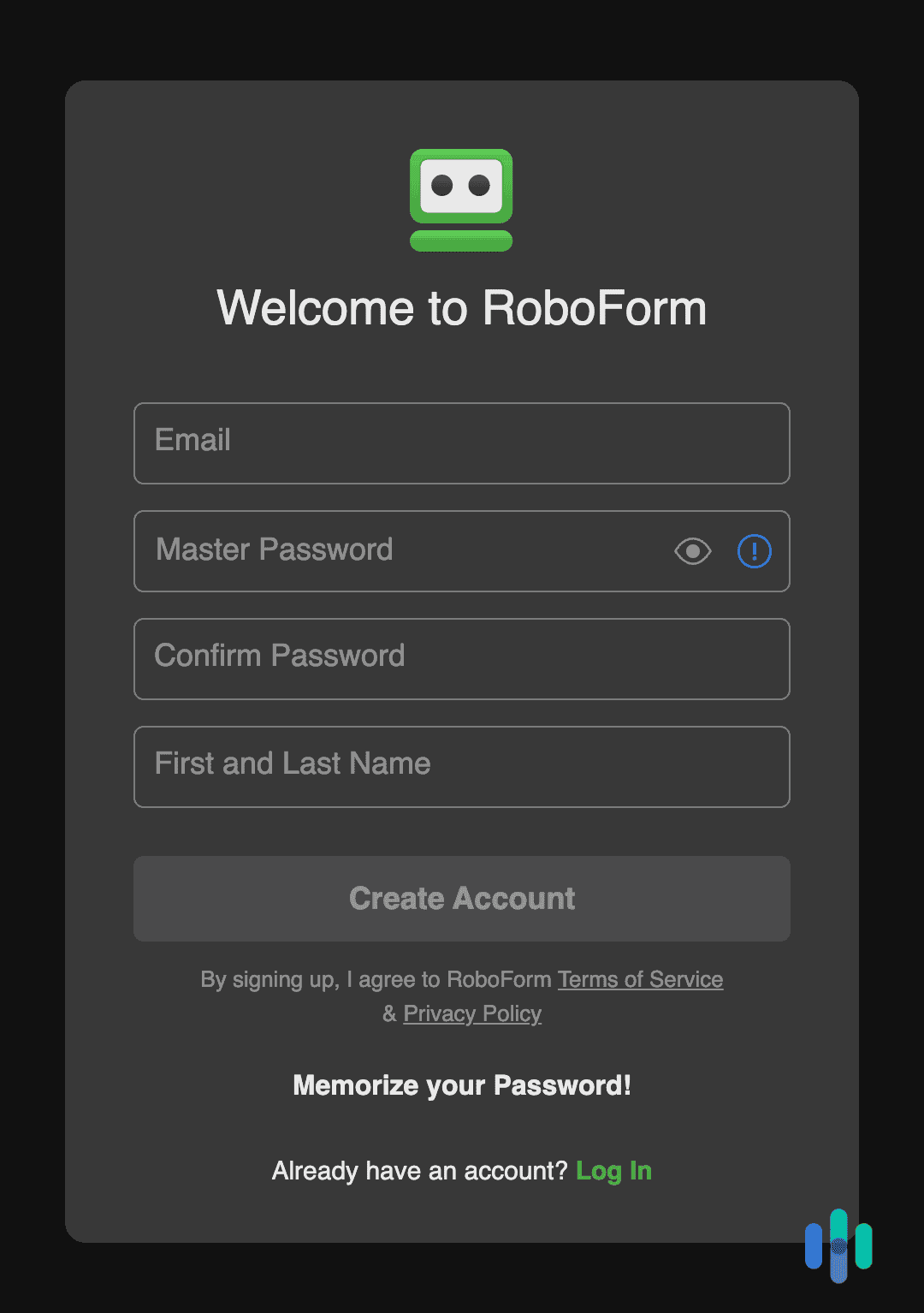
|
NordPass for Business

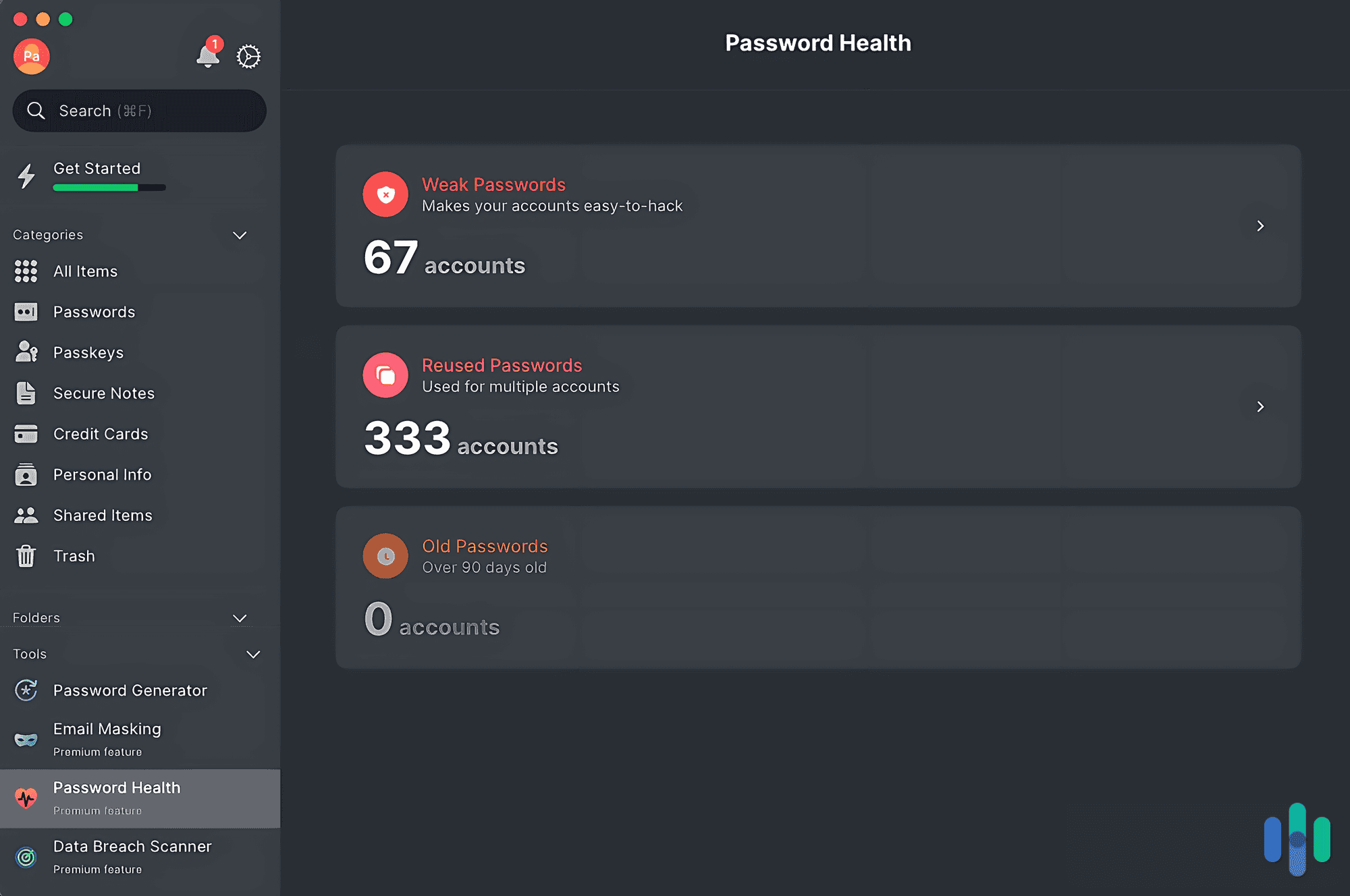
|
Keeper for Business

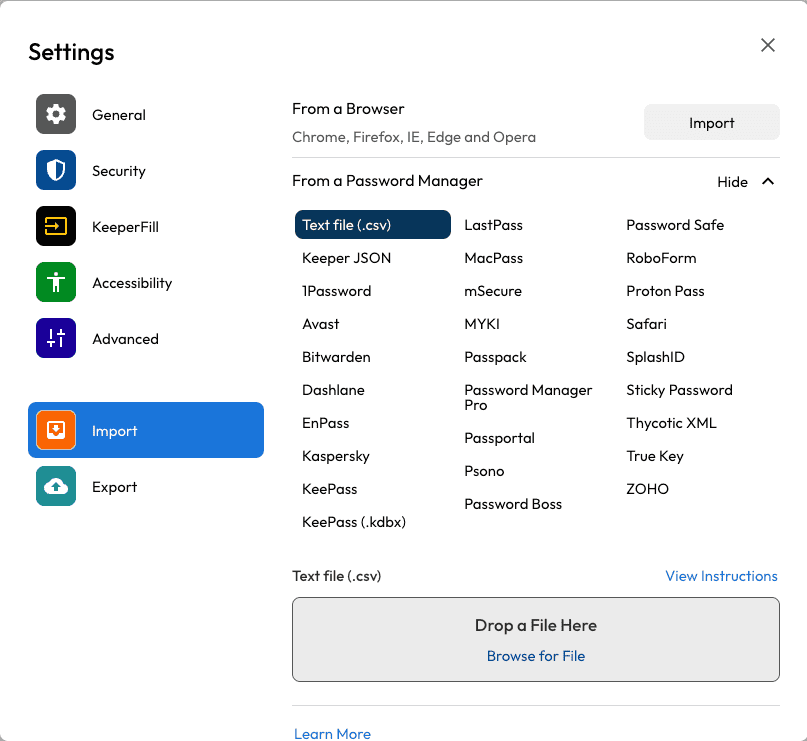
|
1Password for Business

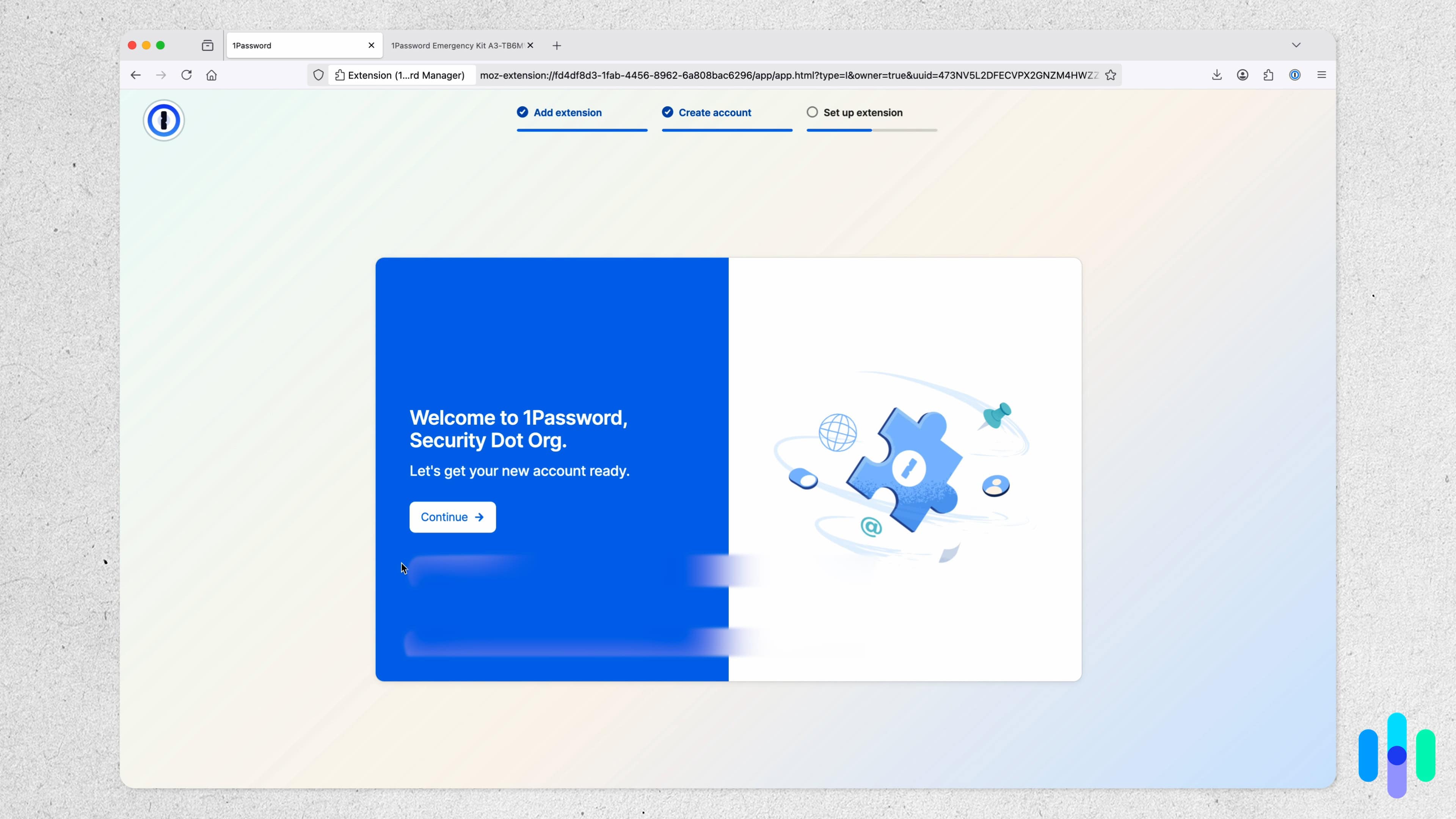
|
ProtonPass for Business

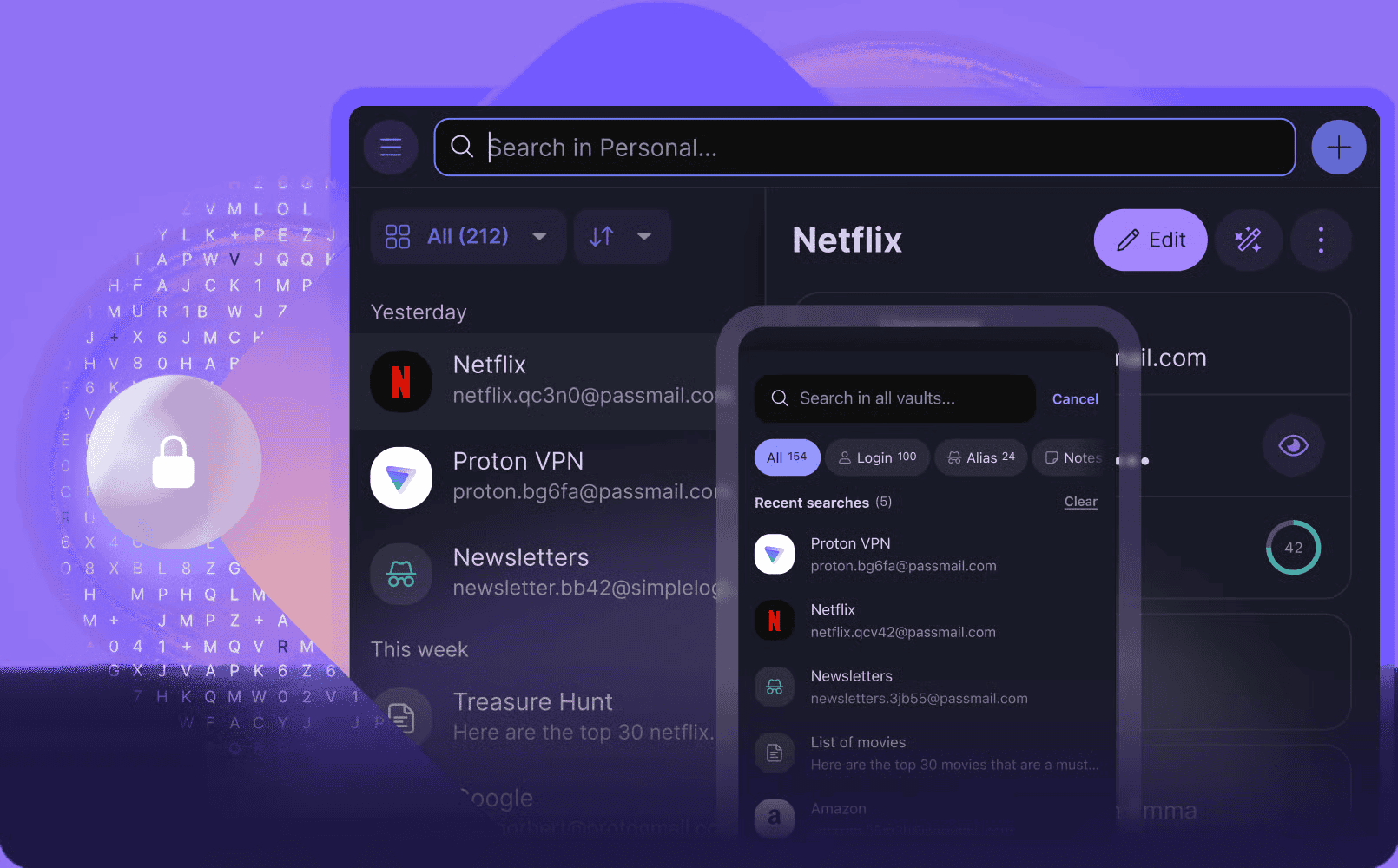
|
|---|---|---|---|---|---|
| Ranking | 1st | 2nd | 3rd | 4th | 5th |
| Ratings | 9.5/10 | 9.5/10 | 9.4/10 | 9.6/10 | 9.3/10 |
| Starting Price (per user/month) | $2.23 | $1.79 | $2.00 | $1.99 | $1.99 |
| Free Trial | 14 days | 14 days | 30 days | 14 days | 14 days |
| Encryption Standard | AES-256 | ChaCha20 | AES-256 | AES-256 | AES-256 |
| Zero-Knowledge | Yes | Yes | Yes | Yes | Yes |
| Two-Factor Auth | Yes | Yes | Yes | Yes | Yes |
| Compliance Certs | SOC 2 Type II, ISO 27001 | SOC 2 Type II, ISO 27001 | SOC 2 Type II, ISO 27001, HIPAA | SOC 2 Type II, ISO 27001 | SOC 2, ISO 27001, FedRAMP |
| Dark Web Monitoring | Yes | Yes | No | Yes | Yes |
| On-Premise Option | No | No | Yes | Yes | Yes |
| Admin Dashboard | Advanced | Advanced | Basic | Advanced | Advanced |
| API Access | Yes | Yes | Yes | Yes | Yes |
| Biometric Login | Yes | Yes | Yes | Yes | Yes |
| Password Sharing | Encrypted | Encrypted | Encrypted | Encrypted | Encrypted |
| Audit Logs | Detailed | Detailed | Basic | Detailed | Detailed |
| Custom Roles | Yes | Yes | No | Yes | Yes |
| Read Review | NordPass for Business Review | 1Password for Business Review |
Essential Password Security Features Every Business Needs

Password managers aren’t just for encrypted password storage. It’s an essential part of every business’ digital security strategy, and as such, there are some features you should absolutely look for when picking the best business password manager.
- Two-factor authentication (2FA): This authentication type requires something you know (your password) and something you have (a phone or hardware token) to verify yourself. Business solutions should support multiple 2FA methods such as authenticator apps, SMS, and hardware tokens.
- Secure password sharing: Password sharing is essential for team collaboration, but it must be done securely. In fact, we believe actual passwords should never be exchanged. This can be done using public-key cryptography, which all of our top password managers for businesses use for secure password sharing.
- Dark web monitoring: While this falls under the nice-to-have category, we recommend looking for a password manager that can monitor the dark web and data breaches for compromised company credentials. Having this feature lets you take action immediately before data breaches damage your company.
Of course, your password manager of choice for your business should also include features we’ve previously discussed, such as a zero-knowledge architecture, strong encryption standard, and a team-friendly central console.
Tips for Implementing A Password Manager Across Your Organization

Once you’ve picked the best password manager for your team, the job doesn’t end there. The next challenge is implementation. Having tested these password managers ourselves, we’ve put together a few tips that can make the process friction-free for you, your IT team, and your employees.
- Start small. Start a pilot program, selecting a small batch of tech-savvy employees for the initial rollout. This batch can provide feedback and potentially assist colleagues during the full rollout. (This is particularly useful if you don’t have an IT team.)
- Create a timeline with clear milestones. It’s easy to get overwhelmed, but keep in mind that implementation doesn’t happen overnight. For instance, you can have initial setup as your first milestone. Then, the following week, aim to start the pilot program. After that, do a bigger rollout.
- Continuous training. Having the right tool is crucial, but without training on proper usage, it could go to waste. We recommend creating video tutorials on how to use the password manager using real-life, business operation scenarios. It also helps to create guides even for simpler functions such as generating passwords.
Conclusion and Recap
In our research into America’s password habits, we found that:
- 2 out of 3 Americans reuse passwords
- About 37 percent still share passwords with other people
- More than half are not confident about the security of their passwords
These stats are scary, especially if those bad password habits make it into your organization. That’s why secure password management is crucial.
For small teams with less than 10 users, RoboForm is our top recommendation. It keeps things simple, functional, and affordable. If your business centralizes their workflows around Google Workspace, we recommend NordPass as all of their business plans support Google Workspace integration. For businesses in regulated industries, Keeper is the best fit. It maintains certifications that meet the strict standards of healthcare, finance, and legal organizations.
To round out those top three, we recommend 1Password for businesses in the tech sector. They offer a wide range of developer tools in all of their business plans that promote efficiency and security. Finally, for companies that want an extra layer of privacy and advanced threat detection, Proton Pass is a strong choice, especially for larger organizations that need robust protection.
FAQs
-
Can password managers be hacked?
No system is completely immune to attacks, but business-grade password managers use military-grade encryption and zero-knowledge architecture that makes successful attacks extremely unlikely.
-
How do password managers work across different devices?
Password managers sync encrypted vaults across all your devices through secure cloud servers. Changes made on one device automatically appear on others within seconds, ensuring your employees always have access to updated credentials.
-
What happens if an employee leaves the company?
Administrators should immediately revoke access to company vaults when employees leave, automatically removing all shared passwords from their devices.
-
How long does it take to implement a password manager company-wide?
This depends on the size of your business, IT resources, and the complexity of existing systems that require integration. Most businesses complete basic implementation within two to four weeks, though full adoption typically takes about six to eight weeks.
-
Can password managers replace single sign-on (SSO) solutions?
Rather than replace, password managers complement SSO solutions. While SSO eliminates passwords for supported applications, password managers can handle the services that don’t support SSO.
-
IBM. (2025). Cost of a Data Breach Report 2025.
https://www.ibm.com/reports/data-breach -
Verizon. (2025). 2025 Data Breach Investigations Report.
https://www.verizon.com/business/resources/reports/dbir/


